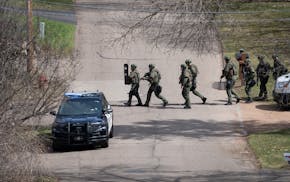Runners will join as many as 20 stampeding bulls as they charge down a quarter-mile track in Elk River this summer.
"The Great Bull Run," inspired by the famous Running of the Bulls in Pamplona, Spain, will debut in Minnesota at the Elk River Extreme Motor Park on June 21.
The Boston entrepreneurs behind the traveling event — it's making stops in a number of cities across the country — say it's a chance to "grab life by the horns."
Animal rights activists assail it, saying that, historically, bull runs are a spectacle of animal cruelty.
News of a planned Twin Cities stop first surfaced last summer, when a May 2014 date at Canterbury Park was discussed. Staff at the Shakopee racetrack had some initial safety concerns, particularly after a bull got loose last August at the nearby Dakota County Fair (no one was hurt). But ultimately, the track passed because the bull run would have interrupted horses' spring training, spokesman Jeff Maday said recently.
Organizers say that more than 2,000 people have signed up for the Elk River bull run and that events in other cities have attracted 5,000 or more runners.
Law school buddies Rob Dickens and Brad Scudder — self-proclaimed adventure guys — started the event after their own efforts to run with the bulls in Spain didn't work out.
"We couldn't make it happen," said Dickens, a former Wall Street attorney. "Everything is booked a year in advance. It costs $3,500 a person. You have to take time off from work. That's when we started joking around about starting a bull run here."
Now, it's a reality. Adventurous Minnesotans can check it off the bucket list for $60 in advance or $75 the day of the event, Dickens said.
"There was a 72-year-old woman who ran with the bulls in Dallas," he said. "It's always something she wanted to do."
Other festivities that day include a "Tomato Royale" food fight, music, food and alcohol.
Dickens said the bull run is designed with human and animal safety in mind.
The 1,500-pound bulls' horns are naturally dull and will not be sharpened as they are in Spain. The organizers also say the bulls are given the "full respect they deserve, and are not antagonized or harmed before, during, or after the run."
The track will be on dirt or grass and lined with scalable fencing that, Dickens said, makes it easy for participants to get out of the animals' way. Veterinary and medical professionals will be on site. But the event still has its risks.
"Running with bulls is inherently dangerous and runners don't want it to be safe," Dickens said. "Danger gives a sense of accomplishment when [the run is] done."
He said that among 15,000 participants in the first four runs, there were three injuries that required a trip to the hospital, including a broken wrist, a fractured pelvis and a concussion.
In California, the Animal Legal Defense Fund and People for the Ethical Treatment of Animals filed a lawsuit seeking to block the events from happening there. The Animal Rights Coalition (ARC) in Minnesota wants to see the event shut down across the United States, said ARC volunteer and special events coordinator Rachel Augusta.
"We are pretty horrified by it," Augusta said. "People don't know how cruel it is," she said, citing starvation and provocation as some of the tactics used in Spain to get the bulls to run.
"It's really important in any situation when talking about animals to put yourself in their perspective," Augusta said. "Think about whether they think it's fun. … The world has been asking and pleading Spain to stop this horrific act. Why would we bring this to America? It's outdated and barbaric."
Organizers of the Great Bull Run say the bulls meet the USDA's federal standards for care and are handled by the Lone Star Rodeo staff.
"[The bulls'] only job is to do this once per month," Dickens said. Otherwise, they eat grass at Lone Star's ranch in Kentucky, he said.
Sarah Barchus is a University of Minnesota student reporter on assignment for the Star Tribune.
Shannon Prather • 612-673-4804

Cigarettes at $15 per pack? Minneapolis might do it.
![St. Louis County Board approved a plan to distribute $24 million in CARES funding, including $6 million to be distributed to small businesses. ] ALEX](https://arc.stimg.co/startribunemedia/ED62G7Y2RWISNRUZQRT3ZTJVHU.jpg?h=91&w=145&fit=crop&bg=999&crop=faces)
Duluth man sentenced to 40 years for role in drive-by shooting that killed 19-year-old

